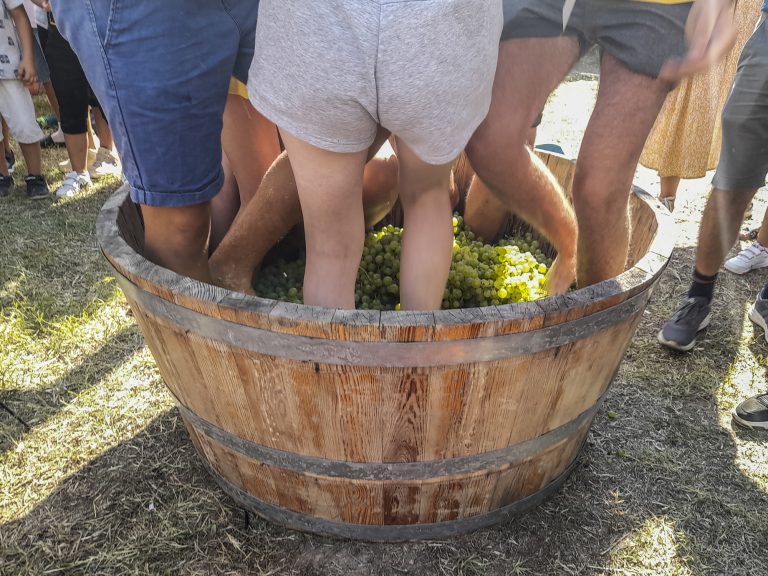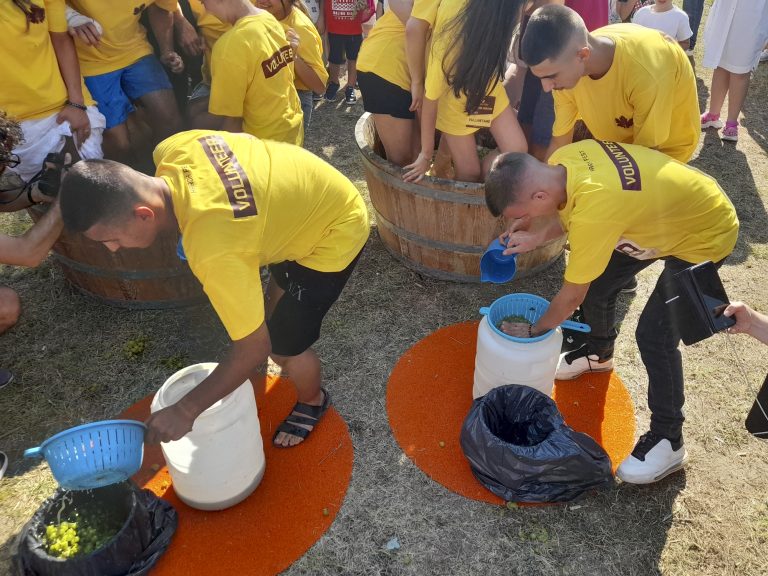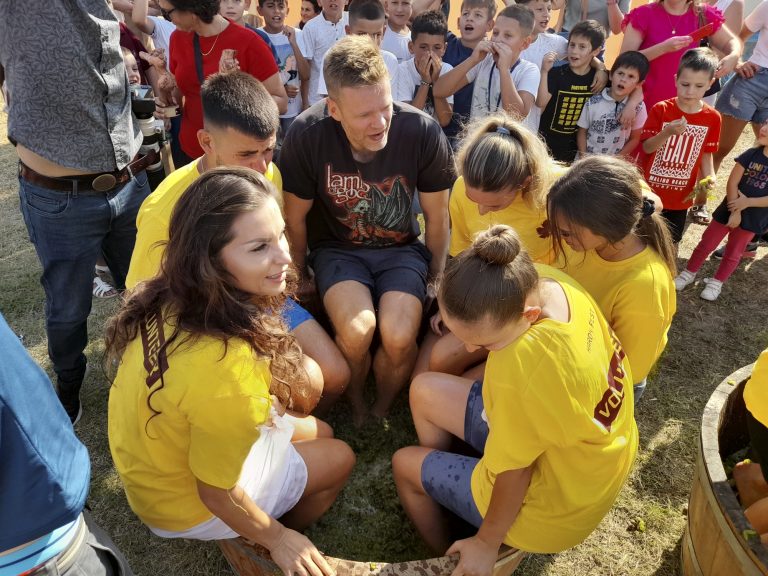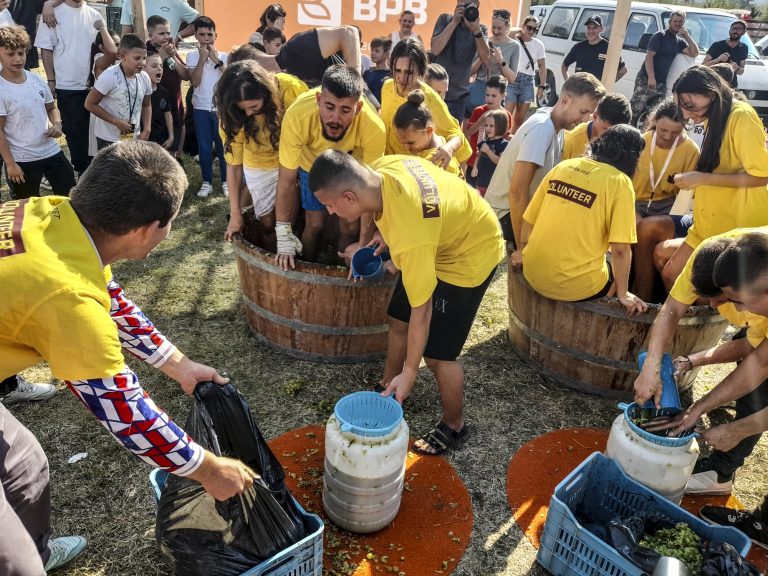“Kookrrat!”
“Rruushat!”
The cheers for the two rival teams participating in the grape-treading competition. They take off their shoes and step inside the wooden barrels.
“Come on, try your hardest,” says a member of the Kokrrat team before the competition started. It is all taking place on the lawn below the Konaku guesthouse, part of the Hardh Fest grape harvesting festival in Rahovec. It is Saturday, September 2, the second day of this year’s edition.
“Rruushat!”
“Kookrrat!”
The teams cheer, drowning out the sound of Guns ‘n’ Roses, whose song “Welcome to the Jungle” was being played through a speaker. The grape-treading competition was scheduled to start over 10 minutes ago, but the grapes were nowhere to be seen.
It is 3:15 p.m. Bon Jovi’s “It’s My Life” starts playing, which slightly distracts the contestants and visitors who are waiting for the crates of grapes, which the organizers call gajbe. It seems no one’s going to bring them. The organizers began to feel the silent dissatisfaction of the tourists. “It’s my life, it’s now or never,” a Norwegian tourist sang in unison with Bon Jovi.
“There are no grapes in grape land,” said a man in his mid-twenties. Rahovec is often referred to as grape land. This expression is a source of pride not only for the winemakers but also for the people of Rahovec.
Morten Visdal, a Norwegian “son-in-law” of Rahovec, as he is married to a local, distracted the waiting tourists. Visdal, along with two other Norwegians and Zana, who had traveled from Prishtina, disregarded the competition rules, which stipulated that contestants must register beforehand, and tried to join in. There were no yellow event t-shirts for the men, as they were reserved for teenagers and festival volunteers. However, one of the shirts happened to be a perfect fit for curly-haired Zana.
The grapes still had not arrived, but rock classics kept the atmosphere upbeat. Visdal’s in-laws told him that they moved his sneakers behind the sponsor’s banner so they are not stepped on by spectators and soaked in grape juice.
Mirsad Zeka finally brought the crates of grapes in a Volkswagen bus. The vehicle read “Grapeland,” and carried the flags of Kosovo and the U.S. Zeka, like all the locals, takes pride in the word “grape.”
“Kookrrat!”
“Rruushat!”
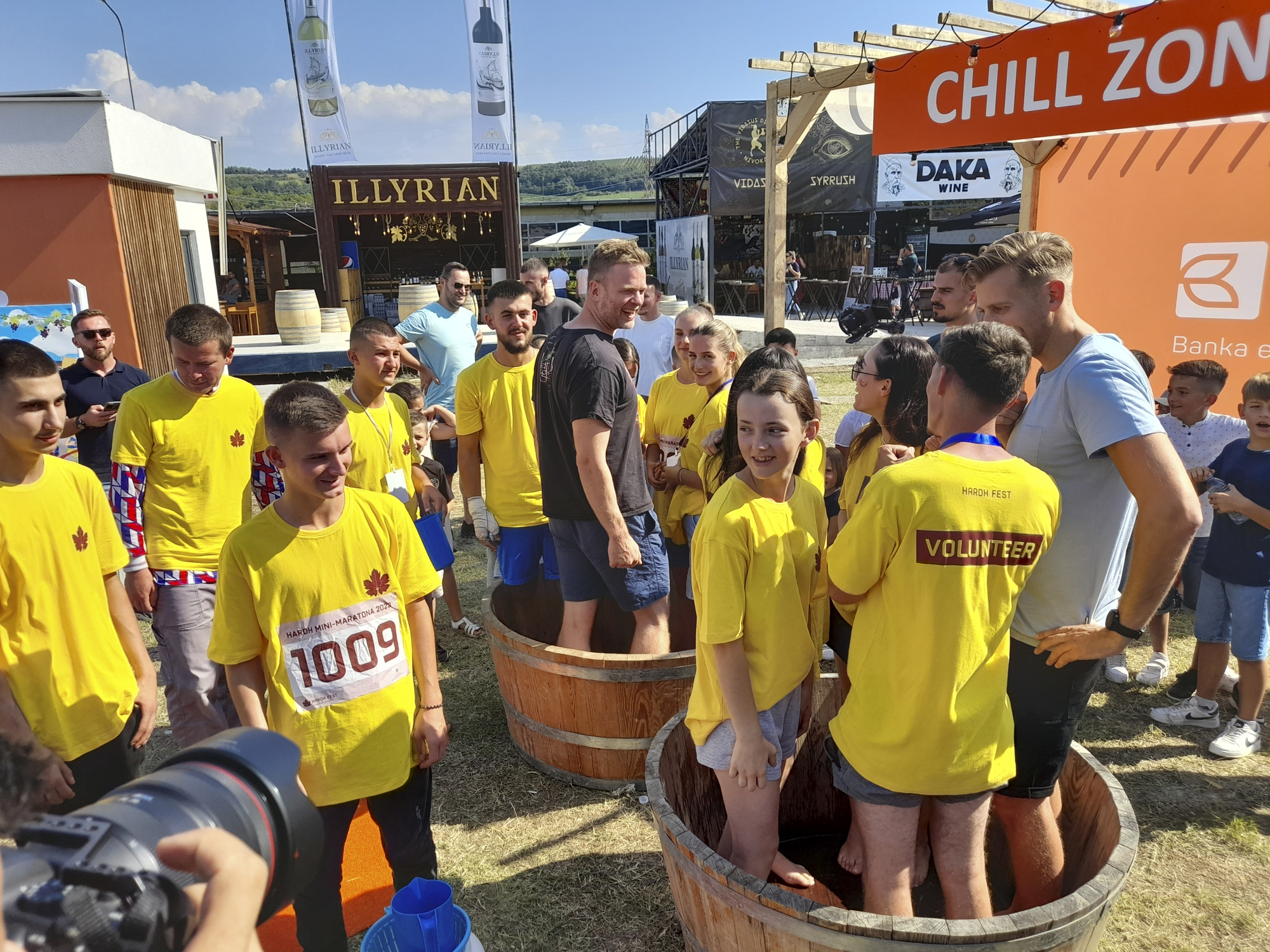
Photo: Rexhep Maloku / K2.0.
“I’ve only come here for this”
Bujar Gashi, communications officer at Prishtina Adem Jashari International Airport and passionate photographer, quickly adjusted the focus on his camera before starting to shoot. “I’ve only come here for this,” said Gashi hurriedly, as he captured the grapes squirting on the contestant’s legs. The competitor Zana frowns when her feet touch the grapes.
“This is a tradition that you see in every family from Rahovec,” said Adnan Rexha, leader of a Hardh Fest volunteer group.
Agron Sokoli, director of Hardh Fest for the last six years, said that the festival wants to preserve the tradition of the vineyards. “Through each edition of the festival the idea of promoting our cultural heritage has begun to grow. We have tried to elevate the vineyard tradition while actively promoting it through various activities. We want to promote the landscape, rural tourism, the cultural heritage of Rahovec and also to promote Kosovo,” said Sokoli, before the grape-treading competition started.
Vjollca Gurgule, director of the non-governmental organization SHL Kosova, which provided volunteers for the festival, asked for Rexha’s help to move the children away from the wooden barrels, since her microphone wasn’t working. “Come on, clap!” Gurgule called to the audience before reading out the contestants’ names.
Genta, Kaltrina, Edonis, Egzona, together with Marten and his compatriot Kyetil Dragebo were in team Kokrrat. Kiesiana, Melisa, Stina, Adri and Zana, were in team Rrushat. Max from Sweden, was also added to the team Rrushat. “Max, thank you,” Gurgule said to the Scandinavian. Team Kokrrat had Muharrem and Ylli as the juice carriers, while the rival team had Rrezon and another Muharrem. Arbnora, Lahuta and Adnan were in the jury and will judge which team has the best grape juice.
Photos: Rexhep Maloku / K2.0.
The grape-treading competition starts in time with Michael Jackson’s “Smooth Criminal.” Music gave energy and rhythm to their stamping feet. An “oof” was heard as someone stepped on another contestant’s grape-covered feet. Zana wiped drops of grape juice from her face.
A Norwegian spectator sang along with pop music legend Michael Jackson, “So Annie, are you ok, are you ok, Annie.”
Gurgule said that grape-treading is one of main activities at Hardh Fest as it shows how much work goes into making the wine and brandy.
Ylli, soaked in shira, as the grape juice is called, started to collect the crushed grapes to begin the filtering process.
“From the grape juice we make pekmez [grape syrup], wine and brandy. Some people just drink it like juice,” said Rexha while the race continued to the sound of Michael Jackson.
Gashi took pictures from all possible angles. Photographers hovered close to the contestant’s legs, which were covered in crushed grapes.
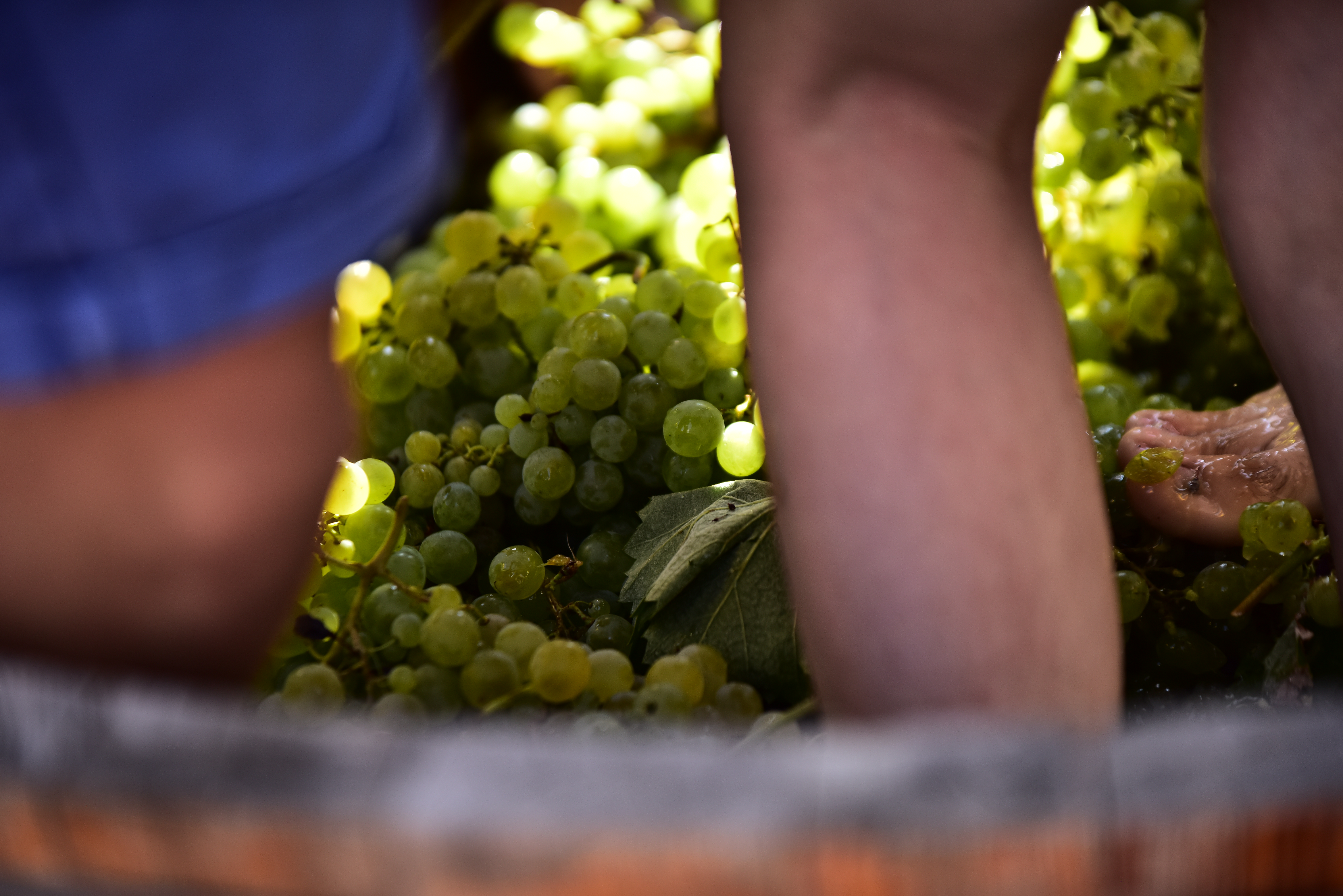
Photo: Bujar Gashi.
“Rrushat! Rrushat!” called a supporter, trying to motivate the contestants. The Kokrrat team’s supporters did the same. Gurgule was worried that the banner from the festival’s donors would be obscured by contestants and was forced to raise her voice. “The microphone is not working,” she called out.
Visdal drew strength from the support of his wife and friends from Rahovec. “Come on, Marten!” shouted one of them.
Festival goers sought shade in the tents where wine producers from all over Kosovo and Albania promoted their craft and other businesses served food.
Returning the favor
Across the lawn, winemakers supply, sell and negotiate. This year, five winemakers came from Albania for their first time at Hardh Fest.
Ardit Fiska, from the Alpeta winery near Berat, said that he was returning the favor to his friends from Kosovo who were part of this year’s wine and grape fair in Berat. “My father has many friends here and has been coming to Suhareka since 2004. We arrived late yesterday, but the dinner and the evening was very good,” said Fiska, referring to the music on September 1 that gathered thousands for a concert of pop, rock and electronic music.
Next to Alpeta’s stall, which sold their special Xha Beqo wine, Kosova Wine’s employees unloaded bottles from different brands.
Fatmir Shehu was a 29-year-old refugee when he experienced the “American dream.” Together with his father, Selami Shehu, they returned to the tradition of viticulture and turned winemaking into a business, exporting their products to the U.S. After serving wine to some visitors, Shehu insisted on telling the story of one of their wine vessels.
“Many visitors are surprised that we produce wine, but it is a tradition. We found a photograph in 1968 under the winery of a clay wine vessel. That vessel held over 2,600 liters and was over two thousand years old,” said Shehu.
He said that his family has been producing wine for seventeen generations but during Yugoslavia, the commercial production of wine was prohibited. “In Rahovec there were over 1,000 small family producers — before they were called izbica.” Rahovec was allowed to have vineyards, but the grapes were processed in the state-run winery.
“We still produced brandy and wine at home, we couldn’t end the season without producing it. While cheating the state,” laughed Shehu, now 53 years old. “I remember when we brought the grapes home, there were also workers who helped with the grape-treading process. When we wanted to distill brandy, we had to mix it three times a day in those wooden casks.”
Yllëza Pista, a professor of Albanian language and literature who has a passion for pottery, helped children make a terracotta grape dish. Children are involved in the Hardh Fest Kids part of the festival.
“The idea is to preserve the cultural heritage. While making something the children preserve it, love it and understand that grapes are part of the town of Rahovec and realize that they should not abandon the tradition,” Pista said, without taking her hands off the table.
“I’m making grapes,” said a little girl from Prishtina who was interrupted by her mother. “She still can’t pronounce the letter rr,” she said. Anuar, one of the children, holds up a drawing he’s made of a bunch of grapes.
With a glass of white wine in hand, Anne Mozelius, manager of three restaurants in Sweden, and her sommelier daughter, Julia, talked to Shehu about the family tradition and growing their business collaboration. “We’ve seen a lot, but there’s a lot more to be seen because we came late last night,” said Anne. “We loved it here right away. A wonderful place and very good wine,” she said. “Very good people,” added Julia. “Yes, very loving people. More open and closer than in Sweden,” the mother replied. “Look at Valbona.”
They were invited here by Valbona Shala, owner of Dardania Wine, which distributes Kosovar wines in Sweden. “I was the first to do this in Sweden. Now I have started selling Kosovo wine in restaurants. I thought it would be difficult,” she said, saying that she initially started with the export of two types of wine from Kosovo, but now she distributes 15 varieties. “The Swedes are buying it more,” said Shala. They have discussed the possibility of expanding their exports to Sweden with the winemakers at Hardh Fest.
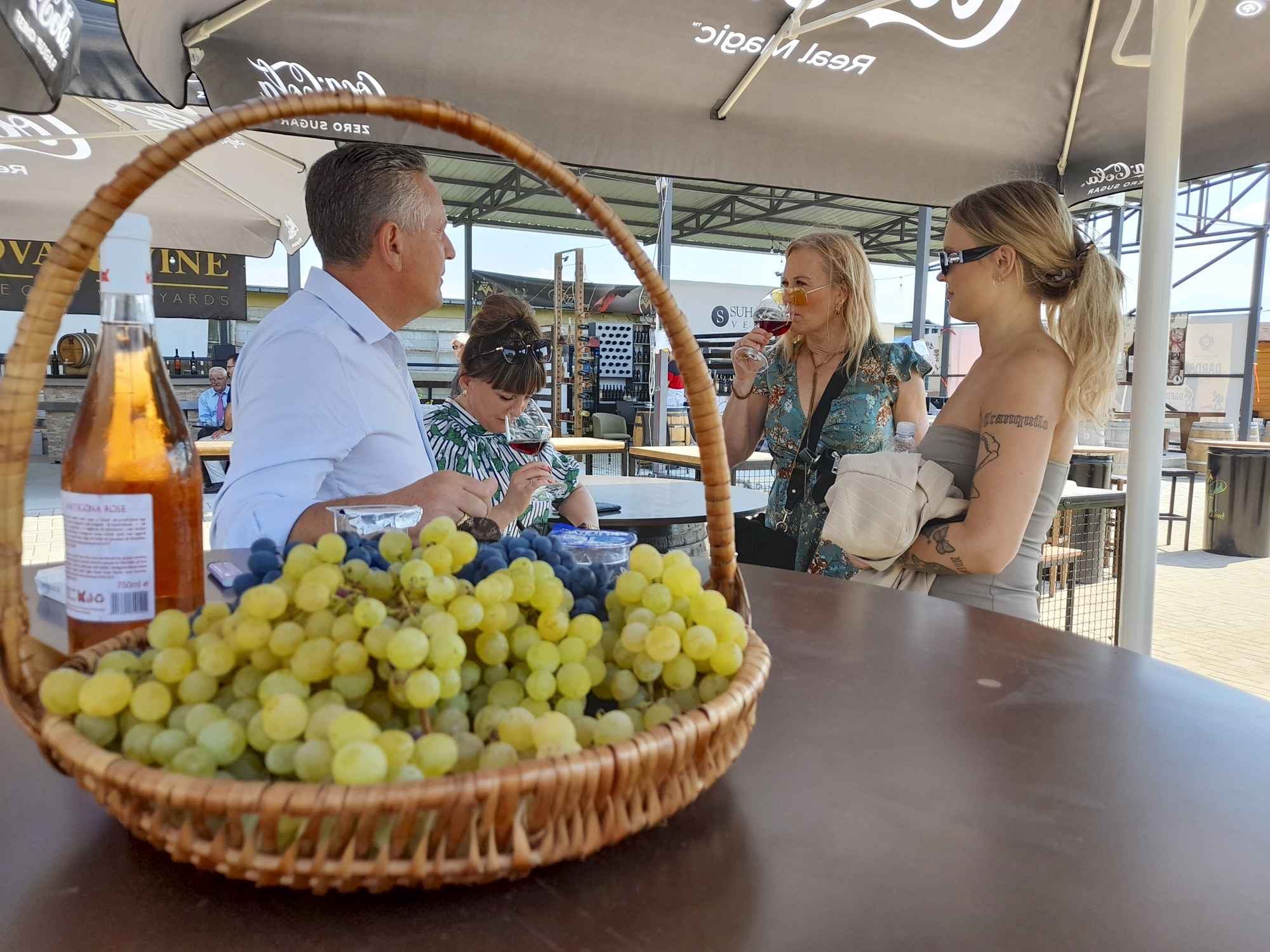
Photo: Rexhep Maloku / K2.0.
Sadik Demiri, an employee of the municipality of Štrpce, said that Hardh Fest is his favorite festival. “Of all the festivals that we can be proud of, this one is special because it is a traditional holiday,” said Demiri, who watched the grape treading with his brother. “Grape-treading is also a long-standing tradition. It’s interesting,” he said.
The grape-treading race started to heat up, the team leaders, Ylli and Muharrem, started to sweat and were drenched in grape juice. Ylli won everyone’s hearts. Even Gashi, the photographer, said “Bravo Ylli,” and put down his camera for a while. Europe’s “The Final Countdown” warned the teams that the finish was near. The wooden barrels were almost overflowing.
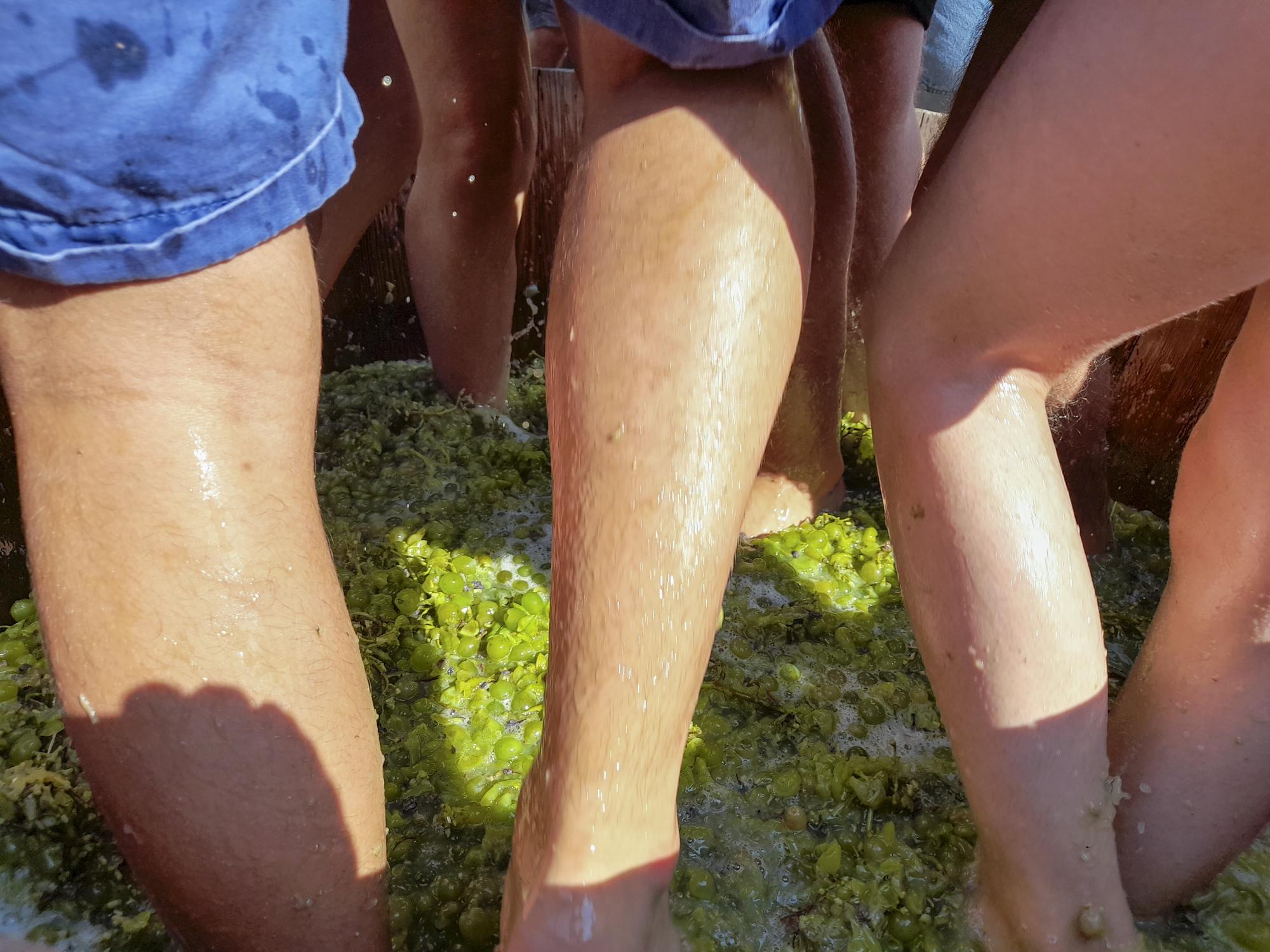
Photo: Rexhep Maloku / K2.0.
Still without a working microphone, Gurgule announced that both teams were winners, which led to discontent among team Rrushat. “Ylli! Ylli!” cheered the supporters. Surprised, Ylli raised his hands in displeasure.
Visdal got his sneakers and socks back. “It was great, it was really fun. I will return from Kosovo to Norway with a special memory. They took pictures, so I will remember it well,” said Visdal. His in-laws took him to wash his feet. As well as tasting the wine, he had also immersed himself in the tradition of grape-treading.
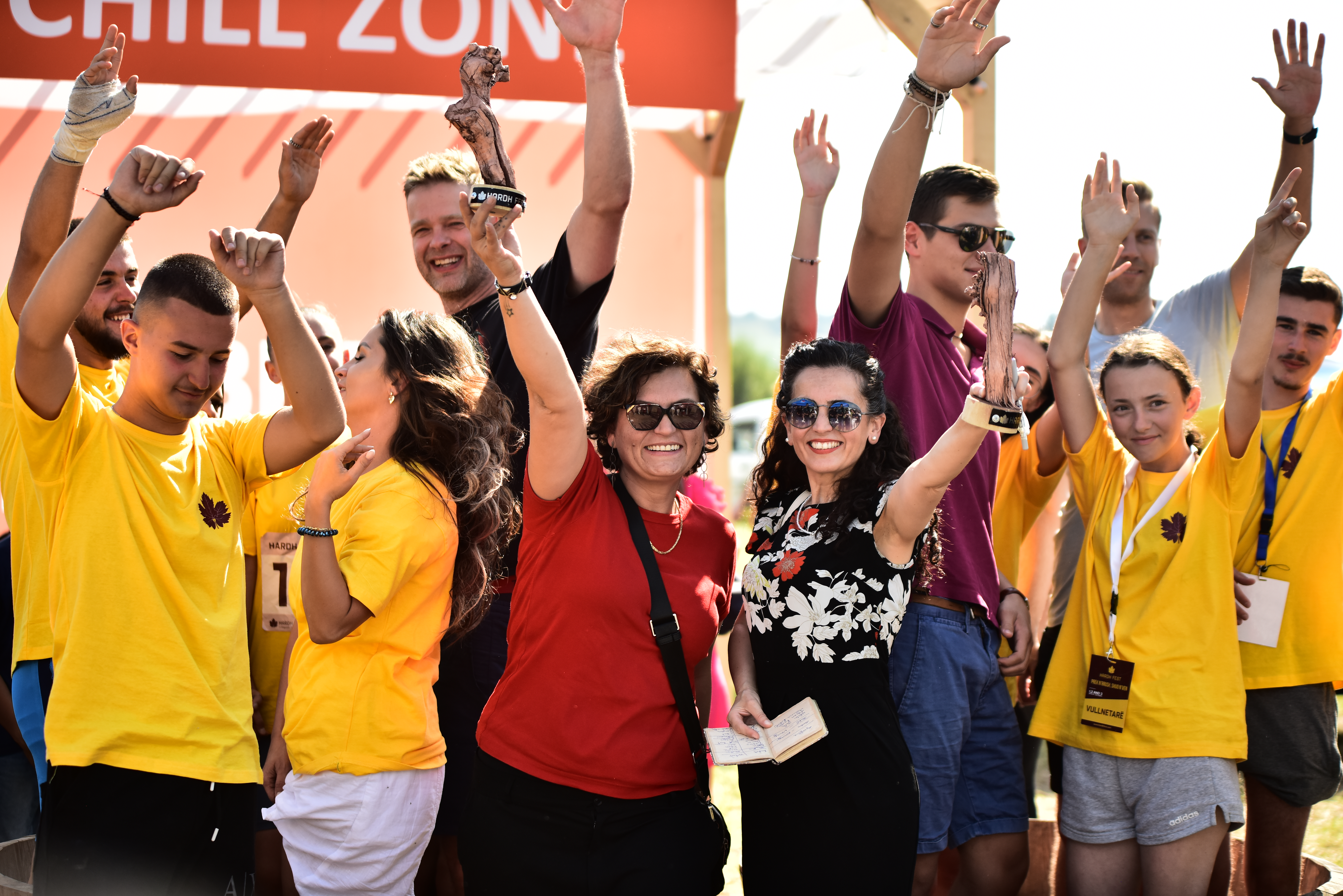
Photo: Rexhep Maloku / K2.0.
“This year’s slogan is ‘Touch the grapes, taste the wine’ so the people come to Rahovec and learn where the wine comes from,'” said Sokoli, the director of Hardh Fest.
“The idea came from tourists who asked us, ‘how are the grapes harvested?’ Out of curiosity I asked them: ‘Why are you asking?'” said Sokoli. “Someone thought it was like harvesting apples, someone else like strawberries. So we decided that this year’s slogan should be ‘Touch the grapes, taste the wine,’ so that people who come to Rahovec see the process from start to finish.”
Feature Image: Bujar Gashi.


